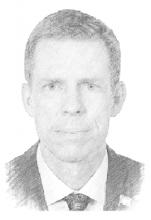You are here
Working women: Key for Jordan’s development
Mar 09,2019 - Last updated at Mar 09,2019
AMMAN — Working women were in the spotlight last week at the London initiative, a major international conference to support investment, growth and jobs, co-hosted by Jordan and the United Kingdom.UK International Development Secretary Penny Mordaunt hailed Jordan’s ambitious plans to bring more women into the workforce and reform the public and private sector, emphasising that “unlocking jobs for women is essential for Jordan’s economic development” and that "the next five years offer an unprecedented opportunity for Jordan’s economic transformation”.
Jordanian women are highly educated, with high school and post-secondary levels on par, or exceeding those of men. Still, only 15.8 per cent of Jordanian women work — the lowest rate in the Arab states and a key factor in Jordan’s ranking in 138th place among 149 countries on the 2018 Global Gender Gap index.
Working women improve their family’s health, education and nutrition situation. They also boost the economy. An International Labour Organisation study estimated that if occupations were more equally distributed between women and men, and if women were to be paid fairly, Jordan could increase its GDP by 5 per cent — the equivalent of almost $2 billion US dollars.
Although we know that gender equality promotes growth, efficiency and progress, much remains to be done globally. Here in Jordan, we have the advantage of strong political will. Jordan has introduced important legislative reforms, including the flexible working hours bylaw and the Social Security Act, which enhance social protection for women and those working in small businesses. Parliament is also now considering amendments to the Labour Law to boost female labour market participation.
But equal access to decent work and social protection for women is not just about doing the right thing: It is a right in itself. It is an obligation under international human rights treaties. Jordan has also committed to achieving a more gender-equal world under the Sustainable Development Goals and in its own policies and strategies.
The UN has been supporting the Government of Jordan to empower people, strengthen institutions and make participation more dynamic. We have forged key partnerships with national women’s mechanisms, civil society and youth to ensure that women can participate actively and equally in economic and political decision-making, on issues that matter to them. This is also essential for social cohesion.
This year’s theme for International Women’s Day —"Think Equal, Build Smart, Innovate for Change” — highlights the need for new approaches to achieving gender equality and social protection, and to remove the barriers women and girls face in accessing public services.
Institutions need to consider women’s needs in all their work. To do so, they need gender-specific data, coupled with new technological approaches to reach the most marginalised women. When innovative social protection schemes are put in place, we can transform discriminatory social norms, narrow poverty rates and increase women’s income — leaving no one behind.
Technology has created new job opportunities, learning options and play-based platforms that engage youth. ICT is also improving service-delivery for some of the most vulnerable women. For example, a UN Women and World Food Programme partnership has harnessed blockchain technology to pay Syrian refugee women enrolled in UN Women Cash-for-Work programmes in Jordan, helping them receive and spenad their earnings quickly and safely.
More than eight years into the Syria crisis, our partnership has evolved from merely providing life-saving emergency assistance to responses that reinforce the resilience of vulnerable communities. This can still be improved by ensuring that women’s specific needs are assessed and addressed. But we need to close gaps in financing and data to design better social programmes.
Both Jordan and the international community in Brussels last year endorsed the call for a more development-oriented response, focused on building resilience and reducing Jordan’s dependency on humanitarian assistance over time. This message is likely to be reiterated at the upcoming "Brussels III" conference. We need to bridge the existing divide.
Let 2019 be the year we make Jordan gender-equal, by ensuring women’s access to jobs and social protection, finding innovative ways to deliver public services that meet women’s needs, and making the way we respond to the Syria crisis inclusive and empowering for women. For this, we need to expand partnerships, especially with civil society and the public-private sector. Let us all do our part to make this a reality and ensure we leave no one behind.
Anders Pedersen is the UN Resident and Humanitarian Coordinator in Jordan.













